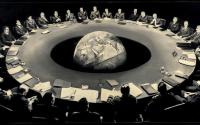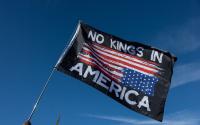October 2004Serge Halimi
Some of the most down-at-heel homes in the remotest villages of West Virginia sport posters for George Bush and Dick Cheney, although their occupants surely do not expect to gain from any further reductions in capital gains tax. We see a lot of "We support our troops" signs. We meet a brother and sister in the state capital, Charleston, who will vote Republican for "religious reasons"; yet the brother is a schoolteacher and he has no health insurance.
West Virginia is coal-mining country. Mines with their pithead gear are still a common sight among the hills and rivers, served by winding roads and railways. Free trade is not popular here. Nor are environmentalists, who are suspected of endangering the few remaining jobs in industry that relocations and pit closures have spared. And the issue of gun control plays into the hands of the most reactionary candidates. In early November schools close on the day that the deer-hunting season opens. Several thousand animals are slaughtered in just a few hours but, we are told: "They’re as common as pigeons round here."
The two presidential candidates have already visited West Virginia half a dozen times since January, both are well briefed on local concerns: faith, patriotism, mining and guns. And they will be back again. On 2 November the state, which is even poorer than Louisiana or Mississippi, will vote for five out of 538 Electors who will in turn choose the next president. But given the uncertainty as to the outcome in this part of the Appalachians, West Virginia is one of a dozen states on which candidates are concentrating.
West Virginia is a stronghold of the United Mine Workers of America and has a long history of social unrest. It was here that a key figure of the labour movement, Mother Jones, organised some of the toughest conflicts between industrial workers and employers for almost 20 years at the beginning of the 20th century (1).
The area went on to become a bastion of President Franklin D Roosevelt’s New Deal, which saved many poor people from starvation in the 1930s. In 1960 Kennedy’s victory in the West Virginia Democratic primary was a decisive moment in his presidential campaign, as it proved that a Catholic could win a Protestant state. In the 1980 election West Virginia was one of only six states to vote against Ronald Reagan.
This Democratic stronghold - it has a Democratic governor, four out of its five members of Congress are Democrats, along with 70% of local representatives and two-thirds of the adult population who are registered to vote - nevertheless did the unthinkable at the last presidential election and came out in favour of George Bush (2). The history of the United States would have been very different if West Virginia had not broken with tradition last time.
"How could anyone who has ever worked for someone else vote Republican, vote against their own interests?" asks Thomas Frank, the author of an unexpected best-seller (3) that explains this derangement particularly well. Whether or not voters have gone crazy, the Republicans are now in control, thanks in part to support from the working-class vote, plus executive, legislative and judiciary power nationwide as well as most of the governorships. Before John Kerry starts taking advice from President Bill Clinton he should recall that it was Clinton’s mix of free market economics with pseudo-progressive social measures that made the Democrats into a minority party.
Old-time virtues
Campaigning in West Virginia would remind him of this simple fact. It would be difficult to find anywhere in the US further from the bourgeois Bohemian neighbourhoods and talking-shops of New York, Boston or San Francisco. Here the two main parties are at odds to demonstrate their attachment to Christian and protectionist values; they focus on hunting, mining, industrial policy and old-time virtues.
Attending one of Bush’s campaign meetings in West Virginia soon makes it clear why neither his problems with the war in Iraq nor his economic and social setbacks have dented his popularity. He may not have the manipulative charm of Reagan or Clinton but he knows how to make a point. No doubt his anti- intellectual stance and his feel for ordinary people connect with the expectations and resentments of his least fortunate supporters. At the end of August a highly charged crowd of 10,000 people welcomed him in a packed hall in Wheeling. Ten days later he went to Huntington. Wherever he goes in this impoverished area, the atmosphere is the same. So is his speech.
Banners in the front row of the meeting in Wheeling proclaimed "Steelworkers for Bush" or "W, like West Virginia". With a few friendly words of welcome a guy called Rick introduces "the man who saved steel, a man of steel, our president George Bush".The speech that follows is long and detailed. Bush leaves nothing out: education, welfare, coal, terrorism, Iraq, steel. He may have already said it 100 times but he triggers a particularly long ovation when he says: "I will never turn over our security concerns to other countries."
He doesn’t forget energy. In a poor state where traditional industry is still important, although under threat, he is sitting pretty. The international community is an easy target, particularly when it uses the World Trade Organisation to prevent Washington from protecting the local steel industry. Here, as in other swing states - Ohio, Pennsylvania, Michigan - the free trade policies of many leading Democrats are proving a distinct disadvantage.
Obviously, Bush did not save US steel. He is in favour of free trade and so are the Republicans. But he at least makes some pretence of caring (4). And, as the Iraq war has shown, he is not afraid of unilateralism. He never uses the global market as an excuse for inaction. On the contrary he maintains that it is up to the US to decide most of the rules governing the new - strategic and business - world order. With Bush, things are simple and it is clear where he stands.
With Kerry, everything is complicated and no one can say how he will react; for example his stance on Iraq varies from day to day with the polls. That is not all. Bush’s family may be rich but George W doesn’t show off his wealth as ostentatiously as does his ultra-rich contender. Kerry comes of a long-established east coast family; he was privately educated in Switzerland, he married a billionaire, he owns five houses and a jet to travel between them. In winter he goes snowboarding, and in summer he goes windsurfing. Even his bicycle cost $8,000.
The money behind Bush is not so noticeable. He is proud of his country, indeed he verges on the arrogant, but when he faces its people he acts humble: "I appreciate the steel workers who are standing behind me. Thank you all. Thank you all very much for coming. It’s good to be back here. Thank you all for the hospitality. You know, this isn’t my first time here. (Applause.) I’ve liked it every time I’ve come. (Applause.) Because the people are down-to-earth, hardworking, decent, and they love America just like I do. (Applause.) I’m here to ask for the vote. (Applause.) I’m here to let you know that I’m willing to get amongst the people and say, I need your vote and I need your help to win this election." The audience chants: "Four more years!"
Heart and soul of America
A few days later in Huntington Bush touches on an issue that was partly responsible for his victory in West Virginia four years earlier: "I’m here because I’m a hunter and I like to fish. (Applause.) I understand a lot of people in these parts like to fish. (Applause.) A couple of you like to hunt. (Applause.) I just don’t get to do enough of it: I’m hunting for votes." The powerful gun lobby, detested by intellectuals and artists, supports the Republicans who in exchange comply with its demands.
It is a popular, dynamic mass movement and Bush knows how to pander to it: "There’s a lot of differences in this campaign. You know, one of the most notable differences came up the other day when my opponent said, well, you can find the heart and soul of America in Hollywood." The audience boos. "Yes. I think you find the heart and soul of America right here in West Virginia."
Over the past four years Bush has repeatedly introduced measures making the rich richer, in this acting even more openly than his predecessors. But he is well-known for his tongue-twisted Bushisms and at times he can seem almost simple-minded. In his leisure time he likes to dress up in cowboy gear and clear brush on his ranch. Like it or not such gestures count. During the Republican convention the film presenting Bush, which hinged exclusively on 11 September, included a telling comment by the narrator: "Some things about George Bush are well-known. Like his lack of pretension." To prove the point the video showed him in a military hospital inviting a soldier who had lost a leg in Iraq and had an artificial limb to go jogging with him round the White House.
Bush never forgets family values: this theme is also often personalised and presented in an affable, unthreatening way. Paying tribute to his wife Laura is a way of reminding the audience about Clinton and the Monica Lewinsky affair.
"Zell [Miller, a Democratic senator who supports Bush] said: ’I wish you’d have brought Laura.’ He’s got really good judgment. (Laughter.) You know, when I asked Laura to marry me, she said: ’Fine . . . I’m willing to marry you, just so long as I never have to give a political speech.’(Laughter.) She was a public school librarian who didn’t particularly care about politics or politicians. I said: ’That’s fine, you’ll never have to give a speech.’ I love her dearly. (Applause.) Perhaps the most important reason of all in putting me back in office is so that Laura will have four more years as your first lady."
The appropriately corny note is emphasised by country music. The words of the song say it all: "I don’t use a lot of big words. But everyone understands what I mean. I am a little rough around the edges. But I think I am exactly what you need."
In Charleston we talked to a former Democrat, now a keen Republican supporter. He was very excited to have attended a very similar meeting at another venue, and said: "Bush, when you see those photos of him on his ranch down in Texas, with jeans and a cowboy hat, that’s genuine. I was in Beckley when he was there a couple weeks ago, and that crowd, 4,000 people, they loved the man. They loved the man. Personally. You had to have been there to know what I mean, and you can’t manufacture that, you can’t fake it. They love him. They connect with him, they think he understands them, and I think he does, too."
‘Best-dressed poverty’
Beckley is in a mining area and the pollution is all too visible. It was in a run-down area like this, home to "the best-dressed poverty the world has ever known" that Michael Harrington had the idea of writing The Other America (5) in the late 1950s. At the time it was more conventional to celebrate the affluent society, which supposedly heralded the end of politics.
Harrington’s book made a huge impact and contributed to the start of federal programmes to fight poverty. Those are a distant memory. On 1 August the Democratic governor of West Virginia decided to cut cash assistance by 25%, from $453 to $340 for a family of three. The plan also eliminated the $100 marriage incentive. At the same time the state government, which is led by a Democrat majority, took advantage of the plentiful state funds available to allocate a $750,000 subsidy to a golf tournament.
Harrington noted that the natural beauty of the area concealed its poverty. Summer visitors to the Appalachians saw mountains, rivers and forests, but not the poor. The same is true now. You have to leave the freeway and venture along narrower roads (well surfaced, thanks to the influence of one of the two senators in Washington) to find little Baptist chapels and clusters of mobile homes. Over the past 20 years the population, which is mainly concentrated in the valleys, has declined and now stands at 1.81 million.
In Mullens (population 1,800) half the houses and shops look as if they have been empty for years. But people are still talking about Bush’s visit to Beckley: "People were very excited. Bush is for coal. He’s all for mining West Virginia coal and banning imports."
The front page of the local paper has a story all about Adam T Johnston, known locally as Lattie, who is home on leave from Iraq. It begins: "When he joined the National Guard his senior year in high school, Adam never dreamed he would be deployed to defend freedom. ’I thought it would be just weekends that I’d be gone and free college money’" (6). His education may cost more than expected. In nearby Justice (population 500) Gwen’s Country Kitchen, a diner serving nourishing fare and pie at $1 a slice, has posted a "Support our troops" sticker right next to the list of church services.
According to the waitress, voting for the Democrats in the presidential election, even though they still hold the majority locally, is a weird idea: "Once it is in their head [to vote that way], it does not matter how good the president is. I think he did a good job. One of the main reasons I like Bush is that he isn’t for abortion. Gore was for the environment and it would have hurt states like these. He was against logging. You are not against coal- mining in Logan [County], and that’s about it." She had never heard of the film Matewan, which tells the story of a violent local strike that happened in 1920. Similar events had encouraged electors not to vote for candidates fielded by the bosses. The town of Matewan is less than 20 miles from Justice as the crow flies.
Phoney populism
The Republicans’ phoney populism and constant insistence on issues of cultural identity - religion, hunting and tradition - take advantage of the fact that people have little time for social history. The local treasurer of the American Federation of Labour-Congress of Industrial Organisations, Kenny Purdue, recalls the long history of class struggle in West Virginia. The 12,000 miners who are still in work, most of whom are union members, take home much better pay-packets than their fellow workers at Walmart.
For them the fight has been justified, even if at times they had to face the National Guard as well as thugs hired by management, which was more concerned about protecting its mules than its miners. In 1907 there were 3,242 deaths in the mines, and there were three times more accidents than in British mines.
Purdue stresses how difficult it is to teach social history at school, despite the victories of the past. The unions have produced a remarkable book on the subject, Labour History Class, which contains miners’ letters, press-cuttings and essay topics. It’s very clear that its objective is to raise young people’s awareness about the class struggles of the past. But local schools rejected the book since they seem to prefer to promote well-known commercial brand names rather than teach social history.
Jobs and the environment are connected. The miners dislike environmentalists, despite their attempts to improve safety at work and restrict pollution of rivers and drinking water. This is mostly because miners often identify with the interests of their bosses. The mining companies have set up a pressure group, Friends of Coal, fronted by a local football star, to sponsor civic activities and sporting events. They have convinced miners that blowing the tops off hills and dumping arsenic and slag in valley bottoms is the only way of saving mining jobs. The Bush administration has generally agreed to all the employers’ demands, making mountain removal much easier and loosening the rules on health and safety. Silicosis still kills hundreds of miners every year in the US.
The Republicans naturally have a ready-made answer, given with conviction by Kris Warner, the party’s chairman in West Virginia: "That area [in the south of the state] is very mountainous. You could never develop this land except by taking the top of the mountains off and taking the coal. Because of lawsuits, because we are taxed to death, we have got to allow people to work or there won’t be anybody left. The mere existence of the firms that remain in business is threatened. If the likes of Massey Energy closes their doors in West Virginia, there will be absolutely no hope [in the south of the state]. And these guys are good neighbours. They not only comply with the federal government regulations, but they build ball fields for the kids, they put on events. The way of life in southern West Virginia would be severely curtailed without the likes of Massey Energy."
Green issues lose jobs
It is easy to see why it is tough going for environmentalists here, with popular voters supporting the Republicans because of the environment. The media does not help because it presents each court case brought by green activists against the mine owners as a blow to employment. We talked to Anna Sale, who works for the Sierra Club environmental pressure group. She explained that there had been a court ruling in June that was seen as a big victory for the environment. But the local television channel took the opposite view, focusing on the fact that the decision would cost hundreds of jobs and highlighting a group of delighted activists.
Is Sale, who is highly educated and fresh out of Berkeley University, really furthering the cause of the environment in West Virginia? At one point she lets slip that "Mining jobs account for less than 2% of the workforce and I would compare the number of jobs that have been lost through mining and the number of streams that have been lost through mining." The Sierra Club is calling on voters to support Kerry, but he has taken care to distance himself from the environmental extremism for which Gore was criticised four years ago.
Robert Byrd, an influential Democratic senator who voted against ratification of the Kyoto protocol says: "Mr Gore and the Clinton administration were drifting too far away from the shore with respect to environmental issues largely having to do with coal. John Kerry went several times to West Virginia. He is going to put some coal in his nostrils, in his hair, and he will be OK."
Nick Casey led the West Virginia delegation at the Democratic convention in Boston in July. He is a leftwinger, close to the unions, well-versed in the social history of his state, impervious to intellectual fads and distrustful of the global market. He is also against the war in Iraq, as were most of the overwhelming majority of delegates at Boston. At the start of the campaign he did not back Kerry but party loyalty has prevailed and he is now forecasting a victory in West Virginia. Casey cannot stand Bush’s cynicism but does acknowledge his political savvy.
Unlike Michael Moore and many other American progressives, he avoids the pitfall of portraying Bush as a fool manipulated by his clique or a crazed preacher just waiting for the apocalypse and the return of the Messiah. He says: "Bush is very comfortable with people. He can deliver a message. He has this attitude which unfortunately America likes: ’Somebody hit me, I am going to hit that somebody in the butt.’ He is not wise, but he is very very decisive even if it’s sometimes stupid. I think he’s a very formidable guy politically."
Since 9/11 and the constant reminders of its horrors (repeated security alerts help to maintain the pressure) most Americans support the idea of a blow for a blow. And they expect their president to be prepared to take decisions. In terms of leadership Kerry is not at an advantage. Bush’s policy on Iraq has run into a dead end and some Republicans even acknowledge that (7). But his presentation of the situation is more or less constant and consistent. He has cleverly turned the initially tricky matter of weapons of mass destruction on its head. If a handful of men armed with box-cutters can destroy two skyscrapers in Manhattan and part of the Pentagon, then it is only right to treat an anti-US dictator, such as Saddam Hussein, as a WMD.
In Huntington Bush preaches to the converted, particularly as the crowd has been filtered at the entrance: "He [Saddam] wasn’t about to comply. So I had a choice to make at this point in time: Do I take the word of a madman, forget the lessons of 11 September, or take action to defend America? Given that - given that choice, I will defend America every time." The crowd applauds, shouting: "USA! USA! USA!" Bush goes on: "Because we acted - because we acted to defend ourselves, 50 million people now live in freedom. (Applause.) Because we upheld doctrine, because the most solemn duty of government is to defend the security of the people of this country, 50 million people now in Afghanistan and Iraq are free."
Europeans, intellectuals and artists may argue all night about exaggerated threats, torture at Abu Ghraib prison and the looting of art treasures. But this carries no weight with conservative working- class people in the US. The Republicans are past-masters of presenting themselves as victims of the liberal elite, a horde of quibbling lawyers, haughty academics, depraved journalists and know-it-all actors. And at times they are quite right. There is no doubt that most intellectuals and "experts" are out of touch with ordinary life and are hopelessly self-centred. They laugh at popular tradition and all the hicks in remote places in the back country who still support Bush. But Fox News and the Republicans thrive on the bitterness their divisive attitude creates.
It is clear from what we saw in the Appalachians that the populism of the US right no longer feeds mainly on racism (West Virginia came out against slavery during the civil war) or on xenophobia. On the contrary it draws on resentment fuelled by the upper classes’ undisguised contempt for those not in the know. This particular kind of populism almost exclusively targets the cultural elite; it does not target business. This con trick is only possible because the smugness of those in the know is even more insufferable than the insolence of the rich.






